With property values in Hawaii continuing to climb, securing a favorable real estate investment loan in the Aloha State can be difficult. A DSCR loan Hawaii can be the perfect solution, with interest rates that scale with a property’s profitability instead of your finances. As long as you can find a property with great income potential, you can get approved for a DSCR loan to purchase it and see substantial returns thanks to more favorable rates than a conventional rental property loan.
At Defy Mortgage, we provide tailored lending solutions to just about every type of borrower. Whether you’re a freelancer needing an FHA loan, a former service member looking for a VA loan, or a real estate investor seeking a DSCR loan, we can customize a solution that works for you. We’re committed to transparency, speed, and a seamless, simplified loan experience.
Drawing from years of expertise, we compiled this guide to inform you on everything you need to know about DSCR loans in Hawaii, from qualification criteria to the step-by-step application process. We’ll also discuss the property types for which you can get a DSCR loan and how doing so can benefit your investment strategy.
Let’s dive in!
Eligibility Criteria for DSCR Loans in Hawaii
A DSCR loan Hawaii is subject to much the same eligibility criteria as DSCR loans anywhere else. The foremost factors lenders look at are your property type and DSCR ratio, followed by your credit score. Some lenders may also consider other personal financial details, such as liquidity.

Minimum DSCR Ratio Required
Lenders typically look for a minimum Debt Service Coverage Ratio (DSCR) of 1.25. Your property’s annual cash flow should be at least 1.25 times greater than the total yearly debt payments. A strong DSCR demonstrates to lenders that the property generates enough income to cover the mortgage, making it a key factor in loan approval. At Defy, we provide DSCR loans for properties with as low as 0.75 DSCR.
Other Financial Requirements
While DSCR loans prioritize property cash flow over personal income, lenders may still require a credit score of around 650-680 or higher. Depending on your property’s DSCR, they may also assess your income and liquidity reserves, looking for a steady income and enough cash to cover 6-12 months of loan payments. At Defy, we offer DSCR loans to borrowers with FICO scores down to 620, and we do not ask to see tax returns or W-2 income at all.
Property Eligibility Considerations
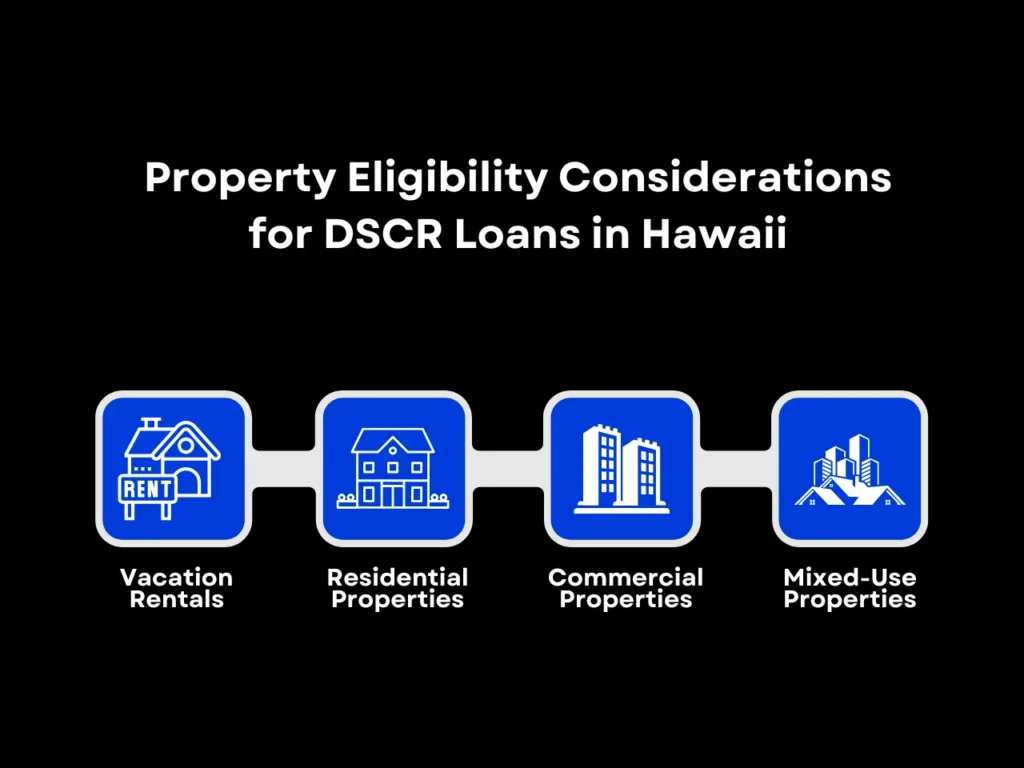
A variety of properties can be financed through a DSCR loan in Hawaii. You can technically finance any property with a positive cash flow. Here are some of the property types you can purchase with a DSCR loan:
Vacation Rentals
Investors interested in short-term rentals, like Airbnbs, will find DSCR loans especially accommodating. Since they focus more on the property’s income, even properties that lie vacant for most of the year can be approved for a DSCR loan as long as they make enough money in their occupied months.
Residential Properties
With purchase prices for housing in Hawaii near all-time-high levels, the rental market is seeing more demand than ever. A DSCR loan can help you easily capitalize on this, and by offering competitive rent rates, you can maximize occupancy and income. However, remember that multi-family homes with more than four units, manufactured homes, and primary homes with single-room rentals are typically not approved for a DSCR loan.
Commercial Properties
Similar to the residential sector, office and retail space tenants are seeing higher rental prices. Leasing at attractive prices can enable you to attract long-term tenants who can provide stable income, insulating you from market fluctuations.
Mixed-Use Properties
House Bill 2090 will soon allow housing in commercially zoned areas in Hawaii, so mixed-use properties will see high occupancy in the near future, especially given the high rental demand.
Benefits of Opting for a DSCR Loan in Hawaii
DSCR loans provide several advantages for Hawaii investors and self-employed individuals seeking flexible mortgage options. Here are some of the most important benefits of choosing a DSCR loan in Hawaii:
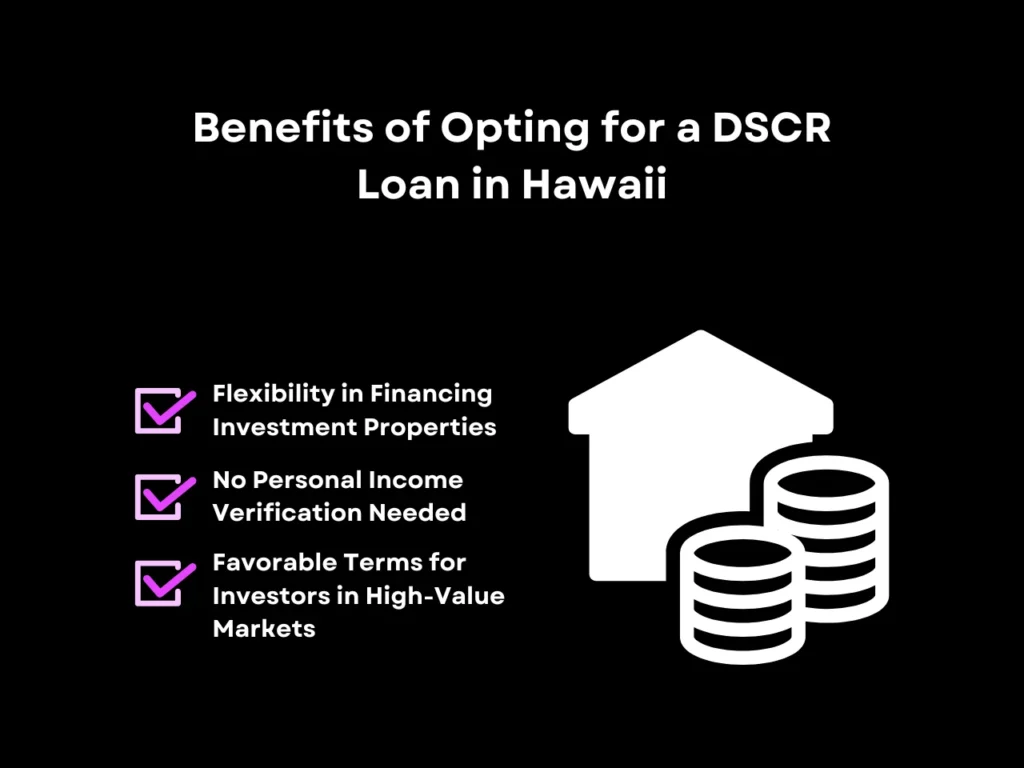
Flexibility in Financing Investment Properties
A DSCR loan offers flexibility for diverse property types, whether for a short-term rental like an Airbnb or an investment property. Since the loan relies on the property’s income, investors can use this option to build portfolios without affecting their personal finances.
No Personal Income Verification Needed
DSCR loans are ideal for self-employed individuals, freelancers, business owners, real estate investors, and retirees, as they do not require extensive personal income verification. They focus on the income generated by the property itself, making them an excellent choice for borrowers with fluctuating incomes. However, some lenders may still ask for certain financial details to ensure you can service the debt if the property’s DSCR is below ideal levels.
Favorable Terms for Investors in High-Value Markets
DSCR loans offer competitive rates and terms in a high-value market like Hawaii, helping investors scale their property portfolios. Since DSCR loans allow the property’s income to be the primary determinant, investors can secure favorable terms even in areas like Oahu that are seeing rising property values in both the residential and commercial sectors.
How to Apply for a DSCR Loan in Hawaii
Securing a DSCR loan in Hawaii follows much the same steps as any other loan. Borrowers need to do their due diligence on lenders and properties to maximize their returns, and ensure all necessary documents are to make the application go as smoothly as possible.
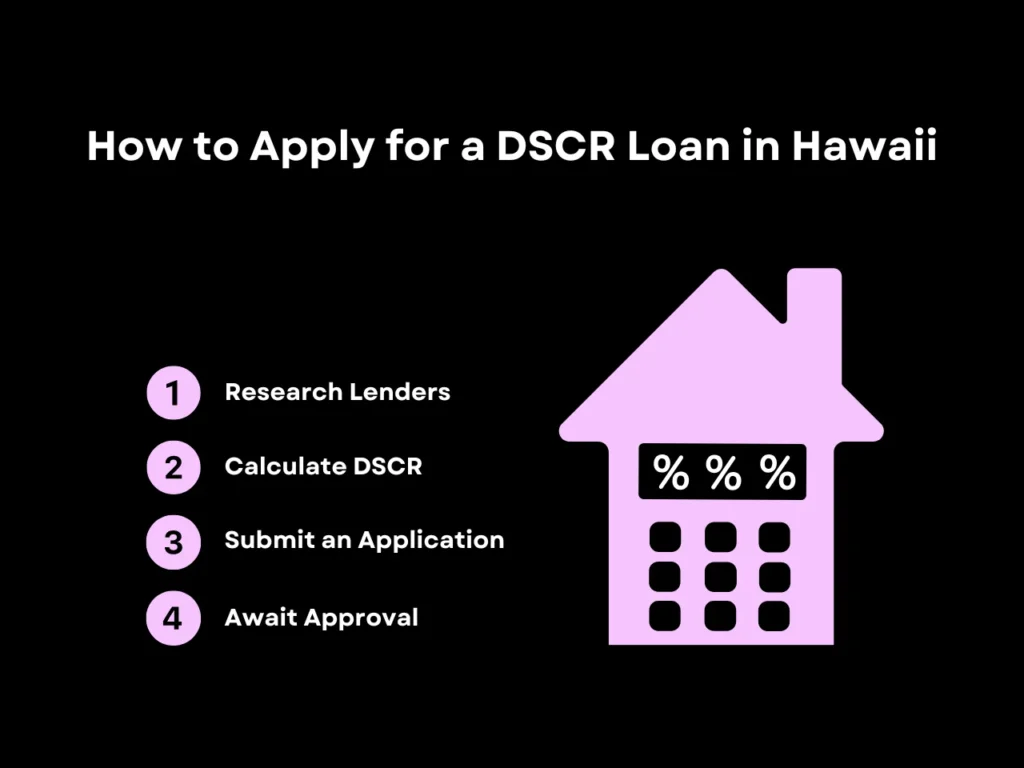
Step-by-Step Application Process
Applying for a DSCR loan is fairly straightforward, but choosing the right lender and a well-performing property are key to ensuring you get the most out of your investment. Make sure to follow these steps:
- Research Lenders: Find lenders specializing in Hawaii DSCR loans. Working with experienced lenders ensures familiarity with Hawaii-specific market trends.
- Calculate DSCR: Calculate your property’s DSCR to ensure it meets the lender’s minimum ratio. If it doesn’t, it may be worth looking for other properties with greater income potential.
- Submit an Application: Complete the loan application with your chosen lender, including details about the property’s projected cash flow. During the application, you will likely be asked about the property’s cash flow so the lender can preliminarily calculate your DSCR.
- Await Approval: After submitting the application and required documents, the DSCR loan typically takes 2 to 6 weeks to be approved. Once approved and closing documents are signed, the lender will transfer the purchase funds to the seller, and you will now become the property owner.
Documents Needed for Application
Ensure you have all the documents to streamline your application for a DSCR loan in Hawaii.
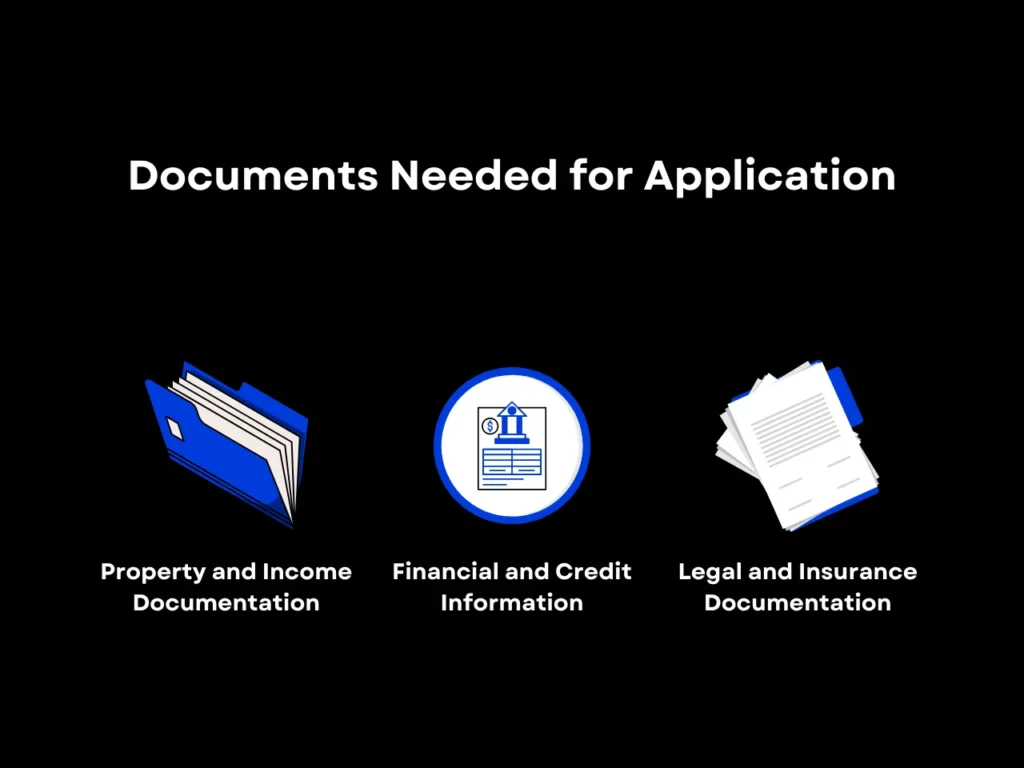
Property and Income Documentation
This mainly involves a report providing an accurate valuation of the property. Lenders typically order this through an Appraisal Management Company (AMC), which usually automatically sends the appraisal to the lender. However, if your lender does not use an AMC, you may need to get the property value report from the appraiser and submit it manually, along with your other documentation.
You may also need to submit lease agreements and operating income statements showing expenses and current or anticipated rental income from the property to help the lender understand the cash flow.
Financial and Credit Information
DSCR lenders place less emphasis on personal finances, but most will look at your credit score to gauge your debt-paying habits. Depending on the DSCR of the property you choose, some lenders may also ask to see your bank statements from the last 3 to 6 months to determine your liquidity and financial health.
Legal and Insurance Documentation
Lenders may ask for proof of insurance to ensure risk management. If you’re purchasing the property under a business entity, you may also need to show the lender your license.
Having these documents ready can expedite the process, preventing delays and ensuring quicker loan approvals.
Choosing the Right Lender in Hawaii
To find the right DSCR lender in Hawaii, it’s essential to seek out certain factors that make it more likely for you to get the most out of your loan. You should also look out for red flags that could indicate that a particular lender isn’t the most efficient choice for your needs. Here are some tips to help you select the right lender:
Focus on Lenders With Hawaii Market Expertise: Lenders familiar with Hawaii’s unique real estate trends, seasonal rental demand, and real estate laws can better understand the potential of your investment property and thus offer you fairer terms.
Look Into Their DSCR Loan Experience: Lenders who specialize in investment property loans, particularly DSCR loans, are likely to be better at structuring the loan terms to match your investment goals.
Compare Terms: Compare rates from multiple lenders to find the one that offers the most agreeable terms for your needs. Lenders might have charges, fees, restrictions, and specific rules on prepayments and other requirements that you should be aware of, especially if you plan to hold the property long-term.
Gauge Their Responsiveness: When you’re making your inquiries, it’s also a good idea to look at how each lender communicates with you. A lender’s ability to communicate openly and respond promptly can make a big difference, especially when working through a complex loan application. Choose lenders who are easy to reach and provide regular updates on the status of your application.
DSCR Loan Hawaii FAQ
What is the minimum DSCR ratio acceptable in Hawaii?
Generally, lenders require a minimum DSCR of 1.25, or the property has to be making 25% more in profit than its debt payments each year. At Defy, we allow DSCR loans for properties with DSCR ratios down to 0.75.
Can I get a DSCR loan for a property outside of urban areas?
Yes, DSCR loans in Hawaii can apply to rural and non-urban areas as long as the property has rental income potential.
Are there any prepayment penalties for DSCR loans in Hawaii?
Private lenders typically apply their own prepayment penalty rules. Still, DSCR loans commonly come with prepayment penalties ranging from 5% in the first year to 1% in the final years of the payment period. Confirm prepayment penalties with your lender if you intend to make a prepayment in the future.
How much down payment for a house in Hawaii using a DSCR loan?
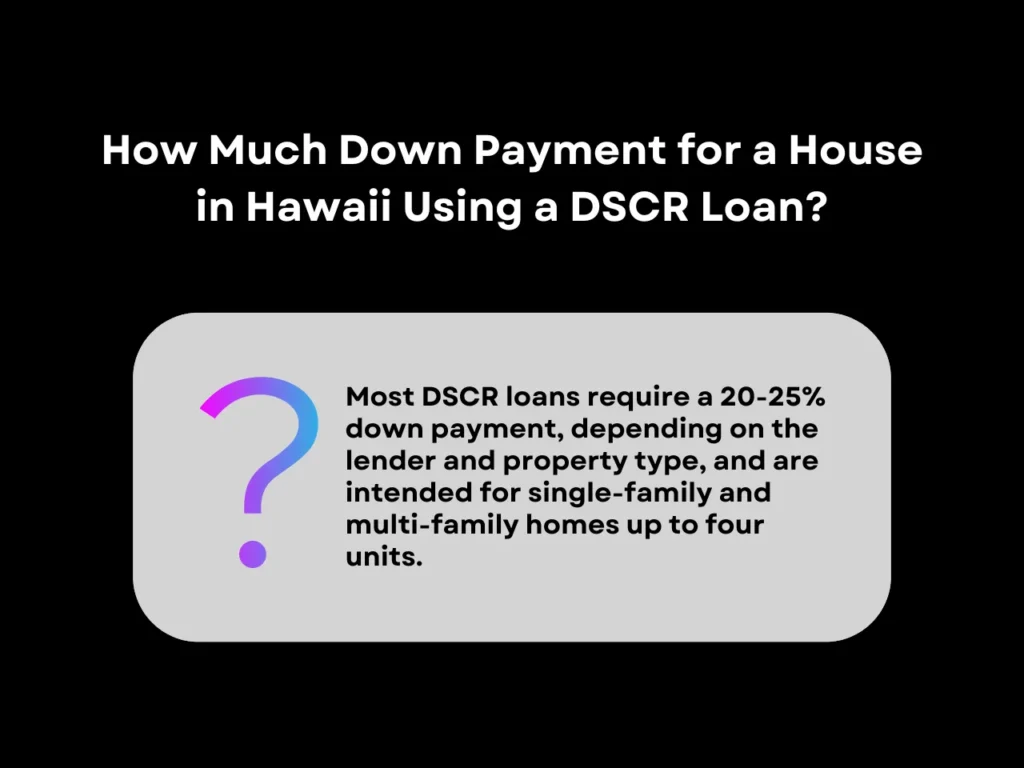
Most DSCR loans require a 20-25% down payment, depending on the lender and property type. However, DSCR loans are designed for single- and multi-family homes of up to four units. Lenders usually don’t approve DSCR loans for properties the borrower intends to use as their primary residence.
Can I use a DSCR loan for short-term rental properties in Hawaii?
Yes, DSCR loans can be used for short-term rental properties. However, remember to stay on top of Hawaii’s new zoning policies that may restrict any short-term rental investments you plan. Some private lenders may also have additional requirements or restrictions depending on property type.
Key Takeaway
With no personal income verification required and terms tailored to investment properties, DSCR loans can be your doorway to flexible financing in Hawaii’s high-value real estate market. If you’re considering a DSCR loan Hawaii to finance your next investment property, remember that your chosen property’s DSCR and your credit score are the primary determiners of your loan terms.
Apart from improving your FICO score and other financials, the main thing you can do to secure the best terms is to choose a property type that’s the most likely to generate consistent income in the location you’d like to purchase in. Maui and Oahu are coveted areas for vacation rentals, while areas with high residential demand may offer long-term occupancy for mixed-use properties.
Would you like to learn more about your investment property loan options? Contact Defy for expert advice that fits your unique financial situation.




